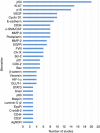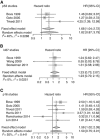Prognostic biomarkers for oral tongue squamous cell carcinoma: a systematic review and meta-analysis
- PMID: 28751758
- PMCID: PMC5589992
- DOI: 10.1038/bjc.2017.244
Prognostic biomarkers for oral tongue squamous cell carcinoma: a systematic review and meta-analysis
Abstract
Background: Identifying informative prognostic biomarkers for oral tongue squamous cell carcinoma (OTSCC) is of great importance in order to better predict tumour behaviour and to guide treatment planning. Here, we summarise existing evidence regarding immunohistochemical prognostic biomarkers for OTSCC.
Methods: A systematic search of the literature was performed using the databases of Scopus, Ovid Medline, Web of Science and Cochrane Library. All studies which had investigated the prognostic significance of immunohistochemical biomarkers in OTSCC during the period from 1985 to 2015 were retrieved. For the five most often evaluated biomarkers a random-effects meta-analysis on overall survival was performed, including those studies that provided the necessary statistical results.
Results: A total of 174 studies conducted during the last three decades were found, and in these 184 biomarkers were evaluated for the prognostication of OTSCC. The five biomarkers most frequently assessed were p53, Ki-67, p16, VEGFs and cyclin D1. In the meta-analyses, the most promising results of the prognostic power for OTSCC were obtained for cyclin D1. For studies of VEGF A and C the results were equivocal, but the pooled analysis of VEGF A separately showed it to be a useful prognosticator for OTSCC. There was no sufficient evidence to support p53, Ki-67 and p16 as prognostic biomarkers for OTSCC. Limitations in the quality of the published studies (e.g., small cohorts, lack of compliance with REMARK guidelines) are widespread.
Conclusions: Numerous biomarkers have been presented as useful prognosticators for OTSCC, but the quality of the conduct and reporting of original studies is overall unsatisfactory which does not allow reliable conclusions. The value of two biomarkers (VEGF-A and cyclin D1) should be validated in a multicentre study setting following REMARK guidelines.
Conflict of interest statement
The authors declare no conflict of interest.
Figures




Comment in
-
Reply to 'Comment on 'Prognostic biomarkers for oral tongue squamous cell carcinoma: a systematic review and meta-analysis".Br J Cancer. 2018 Mar 6;118(5):e12. doi: 10.1038/bjc.2017.491. Epub 2018 Feb 15. Br J Cancer. 2018. PMID: 29449674 Free PMC article. No abstract available.
-
Comment on 'Prognostic biomarkers for oral tongue squamous cell carcinoma: a systematic review and meta-analysis'.Br J Cancer. 2018 Mar 6;118(5):e11. doi: 10.1038/bjc.2017.482. Epub 2018 Feb 15. Br J Cancer. 2018. PMID: 29449675 Free PMC article. No abstract available.
References
-
- Adduri R Sr, Kotapalli V, Gupta NA, Gowrishankar S, Srinivasulu M, Ali MM, Rao S, Uppin SG, Nayak UK, Dhagam S, Chigurupati MV, Bashyam MD (2014) P53 nuclear stabilization is associated with FHIT loss and younger age of onset in squamous cell carcinoma of oral tongue. BMC Clin Pathol 14: 37. - PMC - PubMed
-
- Albert S, Hourseau M, Halimi C, Serova M, Descatoire V, Barry B, Couvelard A, Riveiro ME, Tijeras-Raballand A, de Gramont A, Raymond E, Faivre S (2012) Prognostic value of the chemokine receptor CXCR4 and epithelial-to-mesenchymal transition in patients with squamous cell carcinoma of the mobile tongue. Oral Oncol 48(12): 1263–1271. - PubMed
-
- Almangush A, Bello IO, Coletta RD, Makitie AA, Makinen LK, Kauppila JH, Pukkila M, Hagstrom J, Laranne J, Soini Y, Kosma VM, Koivunen P, Kelner N, Kowalski LP, Grenman R, Leivo I, Läärä E, Salo T (2015) For early-stage oral tongue cancer, depth of invasion and worst pattern of invasion are the strongest pathological predictors for locoregional recurrence and mortality. Virchows Arch 467(1): 39–46. - PubMed
Publication types
MeSH terms
Substances
LinkOut - more resources
Full Text Sources
Other Literature Sources
Research Materials
Miscellaneous

